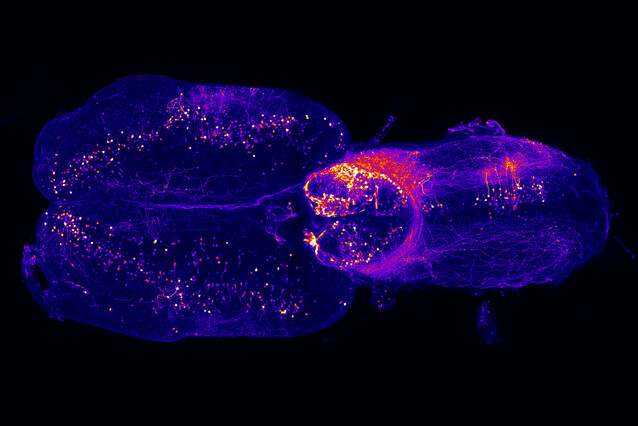ERC Synergy Grant to investigate axolotl brain regeneration

The European Research Council (ERC) awarded a Synergy Grant to IMP senior group leader Elly Tanaka and two international collaborators to delve deep into the regenerative abilities of the axolotl central nervous system. The project aims to map the axolotl brain, to tease out the underlying mechanisms of regeneration, and to identify factors that might help improve brain regeneration when it fails.
The Axolotl serves as an exceptional model system for the study of regeneration in vertebrates. This Mexican salamander can even regenerate parts of its brain following significant injury – an unimaginable feat in humans. However, the precise molecular mechanisms orchestrating regeneration and the extent of functional circuit and behavioural recovery remain unclear.
Senior group leader Elly Tanaka has been investigating tissue regeneration in axolotl for decades, with a strong focus on limb regeneration. Tanaka and her lab now aim to develop the axolotl model system to enable a thorough investigation of central nervous system regeneration, and to use the knowledge gained from this species to develop strategies for regenerating tissues in mammals. In addition to mechanistic insights into regeneration, the scientists will map the various cell types and connections in the axolotl's brain, which will contribute to our understanding of vertebrate brain organisation and evolution.
In the ‘AxoBrain’ project, they will employ cutting-edge, cross-disciplinary technologies to map the axolotl brain at the molecular, cellular, and circuit levels. They will also establish assays to better understand how brain cells react to damage and how neuronal circuits underlying behaviours are regenerated. Their research will also serve as a launching pad for the development of innovative strategies to regenerate tissues in mammals. This project will be run in collaboration with the labs of Barbara Treutlein, professor at ETH Zurich, and Kevin Briggman, scientific director of the department of Computational Neuroethology and managing director of the Max Planck Institute for Neurobiology of Behavior – ceasar.
The ERC will fund the AxoBrain project for the next six years with a prestigious Synergy Grant, amounting to nine million Euro. Synergy Grants support groups of two to four principal investigators who collaborate to tackle large-scale, ambitious research questions, bringing different skills and resources to achieve their goals.
“This ERC project is built on work that Katharina Lust, a postdoc in my lab, initiated in collaboration with Ashley Maynard and Barbara Treutlein. They sequenced the RNA in thousands of cells in the axolotl forebrain under normal and regeneration conditions,” explains Elly Tanaka. “We are excited to extend this collaboration with Barbara to work on different brain regions and to join forces with Kevin Briggmann who brings expertise in connectomics to this project. PhD student Simone Horenkamp in my lab is currently exploring many of the methods that will be important for this ERC Synergy project.”
“2023 has been an ERC year for the IMP – a real testimony of the quality of research conducted here,” says Jan-Michael Peters, scientific director at the IMP. “Three of our group leaders have received an ERC Starting Grant earlier this year. Now this Synergy Grant adds to the IMP’s very high success rate.”
About the ERC
The European Research Council (ERC), set up by the European Union in 2007, is the premier European funding mechanism for excellent frontier research. It funds creative researchers of any nationality and age, to run projects based in participating countries. The ERC offers four core grant schemes: Starting Grants, Consolidator Grants, Advanced Grants and Synergy Grants. With its additional Proof of Concept Grant scheme, the ERC helps grantees to bridge the gap between their pioneering research and early phases of its commercialisation. The ERC is led by an independent governing body, the Scientific Council. Since November 2021, Maria Leptin is the President of the ERC. The overall ERC budget from 2021 to 2027 is more than 16 billion Euro, as part of the Horizon Europe programme, currently under the responsibility of European Commission Executive Vice President Margarete Vestager.
Further reading
An atlas of the salamander brain and its regenerative abilities